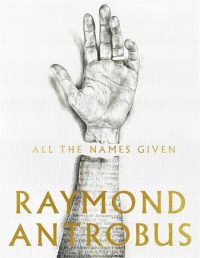All the Names Given (Shortlisted, TS Eliot Prize, 2021)
Writing that is enquiring, taking very little for granted, and making space for readers is always a joy to behold. All the Names Given has these virtues in spades, posing some searing questions not only about the nature of ancestry, family, identity, colonial legacies, racism, but how and where we fit within a larger social world. What might these mean for the living? No easy answers are given, just a willingness to risk the asking and fessing up to the vulnerabilities that follow in its wake. And because Raymond Antrobus suffers from hearing loss, speech becomes an act of translation of the internal ‘living in your head’, an act of love between sometimes very distinct spheres: inside out/ outside in. Juan Ramon Jimenez’s excellent epigraph inaugurates the collection, ‘The body as it daydreams goes towards the earth that belongs to it, from the other earth that does not’.
Reading All the Names Given is to be acutely aware of exchanges with others – real, hidden or even ghostly. In ‘The Acceptance’, reminiscent of Lee Young Li’s ‘Eating Alone’, the father’s spectral return, ‘moving lips, no sound’ and his bewildering act of flooding of the hotel room with tap water, induces anxiety. This scene then cuts to Oshun baptising his father in the river. The poem’s narrator doesn’t interpret; he simply witnesses his father’s surfacing. The Yoruba goddess’ embrace and her gesture of welcome returns one to the quiet of a father taking the hand of his puzzled son, earlier. Come, it seems to say. Touch, embraces, small ordinary gestures of domestic and physical intimacy provide a connective filament that runs throughout the collection: a barber who ‘folds your ears back and runs razors around your sides//so someone you want would touch you later’, or an inmate who ‘squeezed my hand like a letter/ he’d been hoping for’.
In its deaf-centric poetics, the collection ponders the convention of close captions in films, something Antrobus has also spoken about in a BBC radio broadcast, on translating sound for the eye. Following the deaf artist Christine Sun Kim, he asks what else is missing in captions? Mood or feeling perhaps? Antrobus responds with some of his own: ‘[sound of self divided]’; ‘[sound of light between us]’; ‘[sound of newer emptiness]’, even the white space of ‘[ ]’. Metaphor becomes a kind of rhetorical synaesthesia, an act of translation from one state to another. In ‘Upwards (For Ty Chijioke)’,
the ivy
grows above the stinging nettles.What are they singing to us?
Is it painless to listen?…Speech falls on things like rain
sun shades all the feelings of having a heart.
From individual lives the collection expands outwards to take in histories and politics. In ‘Plantation Paint’, the use of black pigments prone to faster fading becomes a wonderful conceit for the appearance and disappearance of slavery from history. There are shadows and silences everywhere, but bearing witness to the pain of history is not to erase complexities; the narrator asks,
I worry
what kind of black
would mark me? …Tell me if I’m closer
to the white painter
with my name than I amto the black preacher,
his hands wide to the sky…without every shade
of my family
appearing and disappearing.
That enjambment straddling the stanza break is apt for a writer with an English mother and a Jamaican father.
Sometimes poetry on the page comes across as hermetically sealed; we are asked simply to admire the well-wrought urn displayed. Here we are invited into a conversation with others – a shared house of words built with occasional lines and quotations gleaned from other artists. The voice is performed with a disarming simplicity of diction, a call whose sound play must be heard in your inner ear when not read aloud, with words and gestures repeated or threaded through as anaphors, sonic patterns or close-call mishearings that rely on someone to complete them:
Through the walls
is me being pushed
out of myselfIt’s silence that stills
the noise in my eyes.Reader, this is the place
I try to take you
when I close them.(‘Closer Caption’)
A balm for the head and heart: generous, wonderfully textured, marvellous.
Gail Low


Leave a Reply